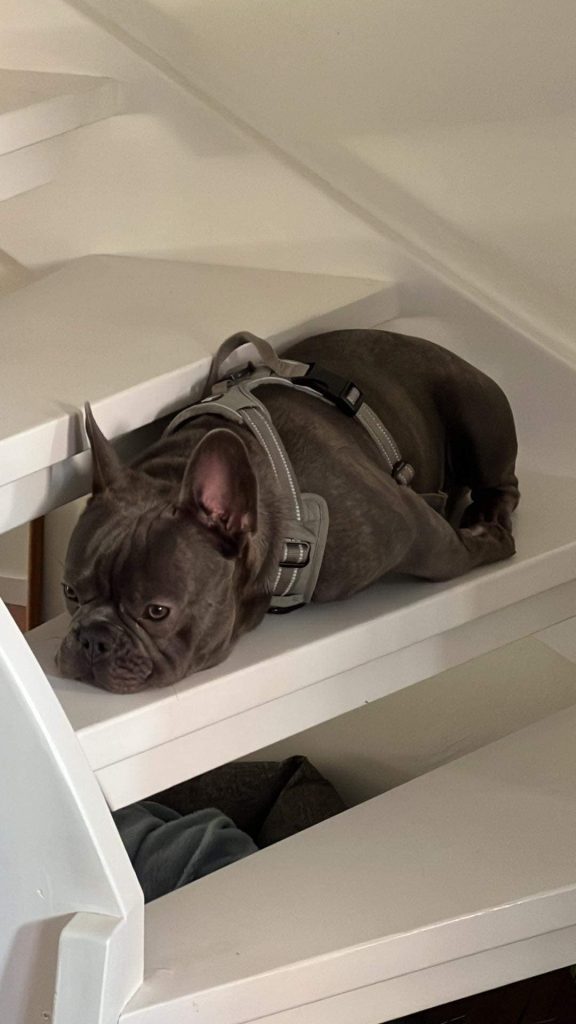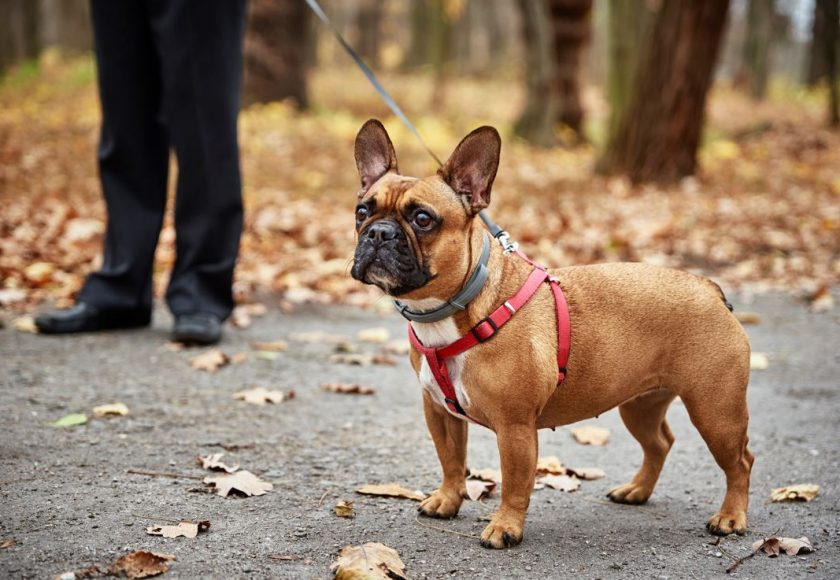Are you curious if your French Bulldog can conquer the stairs? Well, wonder no more! In this informative guide, we’ll explore the unique challenges these adorable pups face when it comes to stairs. With their stocky build and short legs, stairs can be a daunting task. We’ll provide you with valuable tips on how to assist your Frenchie in navigating this common obstacle with confidence. Let’s ensure the safety and well-being of our furry friends together on this stair-climbing journey!
Key Takeaways
- Stairs can be dangerous for French Bulldogs, especially those with back and joint issues.
- French Bulldogs have a higher risk of toppling over due to their muscular chests and short legs.
- Intervertebral Disc Disease (IVDD) is a condition that can be triggered by going up and down stairs and can lead to severe joint issues.
- Maintaining a lean and healthy weight, using a harness instead of a collar, and providing alternative options like ramps or stairs can help prevent IVDD in French Bulldogs.

Dangers of Stairs for French Bulldogs
Using stairs can pose dangers for French Bulldogs. Due to their unique physiology, French Bulldogs are more susceptible to health risks when navigating stairs. Their stocky build, short legs, and flat face make them prone to hip dysplasia, spinal cord injuries, arthritis, and obesity.
These conditions can cause pain, discomfort, reduced mobility, and difficulty in using stairs. Hip dysplasia, a common condition in French Bulldogs, causes pain and inflammation in the hips, making it harder for them to climb stairs. Spinal cord injuries, such as Intervertebral Disc Disease (IVDD), can result in spinal cord compression and pain, making it difficult for French Bulldogs to move.
Arthritis, which causes inflammation and stiffness in the joints, can also make climbing stairs challenging for them. Additionally, obesity puts strain on their joints and reduces their mobility, making it harder for them to climb stairs.
To ensure the safety and well-being of French Bulldogs, it is important to monitor their mobility, maintain a healthy weight, and provide alternative options like ramps or lifts to avoid the risks associated with using stairs.
French Bulldogs and IVDD
- French Bulldogs have a higher risk of developing Intervertebral Disc Disease (IVDD), a condition where the discs between the vertebrae bulge or burst, causing pain and nerve damage. This can make going up and down stairs a potential risk for your French Bulldog. Here are some important points to keep in mind:
- French Bulldogs with hip dysplasia may find it harder to climb stairs due to discomfort in their hips.
- Luxating patellas, a condition where the kneecaps pop in and out of place, can also affect a Frenchie’s ability to use stairs.
- Senior French Bulldogs may have reduced mobility and muscle strength, making stairs challenging for them.
- Stairs can put strain on the spine and exacerbate the symptoms of IVDD in French Bulldogs.
To ensure the safety and well-being of your French Bulldog, it is important to take precautions when it comes to stairs.
Consider these tips:
- Consult with your veterinarian for guidance on managing hip dysplasia, luxating patellas, or IVDD.
- If your Frenchie struggles with stairs, consider installing a ramp for a less steep alternative.
- Move your Frenchie’s belongings downstairs to avoid the need for stairs.
- Provide guidance and reassurance to help your Frenchie overcome any anxieties about stairs.

Symptoms and Treatment of IVDD in French Bulldogs
To identify and address the symptoms of IVDD in your French Bulldog, it is important to understand the signs and treatment options available. IVDD, or Intervertebral Disc Disease, is a condition that affects the discs between the vertebrae in the spine of French Bulldogs. It can cause pain, nerve damage, and even paralysis.
The symptoms of IVDD can vary depending on the type of disc herniation, but some common signs to look out for include muscle spasms over the back or neck, hind leg weakness and pain, unwillingness to jump, knuckling under, crying out in pain, reduced appetite and activity level, and loss of bladder or bowel control.
If you suspect that your French Bulldog may have IVDD, it is important to consult with a veterinarian for a proper diagnosis. This may involve x-rays, neurological exams, and imaging scans. Mild to moderate cases of IVDD can often be treated with anti-inflammatory medications and confined rest. However, severe cases may require surgery to alleviate pressure on the spinal cord.
In addition to medical treatment, post-surgical physical rehabilitation can help strengthen muscles and aid in the recovery process. If surgery is not successful, a dog wheelchair may be recommended to ensure a healthy and active life for your French Bulldog.
Preventing IVDD in French Bulldogs
To prevent IVDD in French Bulldogs, you should prioritize their joint health and overall well-being. Here are some important steps you can take to keep your French Bulldog safe and minimize the risk of IVDD:
- Training French Bulldogs for stairs: Start by introducing your Frenchie to stairs at a young age, using positive reinforcement and rewards to create a positive association. Gradually increase the difficulty of the stairs as your Frenchie becomes more confident and comfortable.
- French Bulldog stair climbing: Teach your Frenchie proper stair climbing techniques, such as taking one step at a time and using all four paws for stability. Avoid letting them jump or skip steps, as this can put unnecessary strain on their joints.
- Regular exercise and weight management: Engage your Frenchie in regular exercise to keep their muscles strong and maintain a healthy weight. Excess weight can increase the risk of IVDD, so consult with your veterinarian to determine an appropriate diet and exercise plan for your Frenchie.
- Provide alternative options: Consider using ramps or pet stairs as an alternative to regular stairs. These options can reduce the strain on your Frenchie’s joints and make it easier for them to navigate different levels of your home.

Physiological Factors Affecting French Bulldogs’ Ability to Use Stairs
When considering the ability of French Bulldogs to use stairs, it is important to take into account various physiological factors that can impact their mobility. French Bulldogs have a stocky build, short legs, and a flat face, which can make using stairs more challenging for them. They are prone to hip dysplasia, spinal cord injuries, arthritis, and obesity, all of which can cause pain, discomfort, reduced mobility, and difficulty in using stairs.
Hip dysplasia is a common condition in French Bulldogs that causes pain, inflammation, and reduced mobility in the hips. This discomfort can make it harder for them to climb stairs. Veterinary consultation is important for managing the condition and alleviating discomfort.
Spinal cord injuries or intervertebral disc disease (IVDD) can also make it challenging for French Bulldogs to use stairs. IVDD causes spinal cord compression and pain, making it difficult for them to move. French Bulldogs with spinal cord injuries should avoid stairs, and ramps or lifts can be safer alternatives.
Arthritis can also make it hard for French Bulldogs to go up and down stairs. It causes inflammation, pain, and stiffness in the joints, making climbing stairs difficult and uncomfortable. Monitoring mobility and consulting with a veterinarian is important.
Lastly, obesity can make it harder for French Bulldogs to climb stairs. Extra weight puts strain on their joints, reducing mobility. Obese French Bulldogs may experience lethargy and muscle atrophy. Maintaining a healthy weight is crucial for their joint health and overall well-being.
Considering these physiological factors, it is important to take precautions and provide alternatives, such as ramps or lifts, to ensure the safety and comfort of French Bulldogs when using stairs.
Mobility Problems That Can Affect a Frenchie’s Ability to Use Stairs
Considering the physiological factors discussed earlier, it is important for you to be aware of the mobility problems that can affect a Frenchie’s ability to use stairs. Here are four common issues that can impact their mobility and make stairs challenging for them:
- Hip Dysplasia: This condition causes pain, inflammation, and limited mobility in the hips, making it harder for French Bulldogs to climb stairs without discomfort.
- Luxating Patellas: Kneecaps that pop in and out of place can lead to wear on ligaments and a bow-legged stance, making it difficult for French Bulldogs to navigate stairs.
- Intervertebral Disc Disease (IVDD): Hardening of spinal discs reduces flexibility and mobility, making it challenging for French Bulldogs to move up and down stairs.
- Osteoarthritis: This condition affects the cartilage in joints, causing bones to rub together, resulting in pain and decreased mobility, making stairs a challenge for French Bulldogs.
To help your Frenchie with stairs, it is important to consult a vet for appropriate medications, physical therapies, or surgeries to improve their mobility. Installing a ramp for less steep stairs can also assist them. If possible, consider moving your Frenchie’s belongings downstairs to avoid the need for stairs altogether.
Providing guidance, reassurance, and taking things slowly can help your Frenchie overcome anxieties about stairs. And always remember to praise your Frenchie for their bravery when they successfully navigate stairs.

How to Help a French Bulldog With Stairs
If your French Bulldog is struggling with stairs, there are several ways you can help them improve their mobility and feel more comfortable. First, consult with your veterinarian to ensure there are no underlying health issues contributing to their difficulty. They may recommend medications, physical therapies, or even surgeries to improve your Frenchie’s mobility.
In terms of making the stairs themselves more accessible, you can install a ramp for less steep stairs. This will provide a more gradual incline, making it easier for your Frenchie to navigate. Additionally, consider moving your Frenchie’s belongings downstairs to eliminate the need for them to use the stairs altogether. Providing guidance and reassurance can also help your Frenchie overcome any anxieties they may have about stairs.
Take things slowly, praising your Frenchie for their bravery when they successfully navigate the stairs. Remember, patience and positive reinforcement are key. By taking these steps, you can help your French Bulldog overcome their struggles with stairs and improve their overall mobility.
Frequently Asked Questions
Are All French Bulldogs at Risk of Developing Ivdd?
All French Bulldogs are at risk of developing IVDD, a condition where the spinal discs bulge or burst. This can be triggered by activities like going up and down stairs. It’s important to be aware of the risks and take precautions to keep your Frenchie safe.
What Are Some Signs That a French Bulldog May Be Experiencing Hip Dysplasia?
Some signs that your French Bulldog may be experiencing hip dysplasia include limping, difficulty climbing stairs, and reduced mobility. Consulting with a veterinarian is important for managing the condition and alleviating discomfort.
Can French Bulldogs With Arthritis Safely Use Stairs?
Yes, French Bulldogs with arthritis can safely use stairs, but it may be more difficult and painful for them. Take precautions like providing a ramp or assisting them, and consult with a vet for proper management.
How Does Obesity Affect a French Bulldog’s Ability to Use Stairs?
Obesity can make it harder for your French Bulldog to use stairs. Extra weight puts strain on their joints, reducing mobility. Maintain a healthy weight to protect their joints and overall well-being.
What Can Be Done to Help a French Bulldog Overcome Their Fear of Stairs?
To help your French Bulldog overcome their fear of stairs, start by offering guidance and reassurance. Take things slowly, praising their bravery. Consider consulting a vet for additional support, and installing a ramp for less steep stairs.

Conclusion
In conclusion, when it comes to stairs, French Bulldogs face unique challenges due to their physical characteristics and potential health issues. However, with proper care and assistance, they can navigate stairs safely and confidently. Just imagine your furry friend conquering those steps like a brave little adventurer, overcoming any obstacles in their path.
So, remember to provide support, prevent injuries, and promote a healthy lifestyle for your beloved Frenchie. Together, we can ensure their safety and well-being on their stair-climbing journeys.




